|

by Jim Willis
May 17, 2023
from
AncientOriginsUnleashed Website
Italian
version
Spanish
version
|
Jim
Willis
is
author of several books on religion and spirituality, he
has been an ordained minister for over forty years while
working part-time as a carpenter, the host of his own
drive-time radio show, an arts council director and
adjunct college professor in the fields of World
Religions
and
Instrumental Music.
He
is author of Supernatural Gods: Spiritual Mysteries,
Psychic Experiences, and Scientific Truths and Ancient
Gods: Lost Histories, Hidden Truths, and the Conspiracy
of Silence |
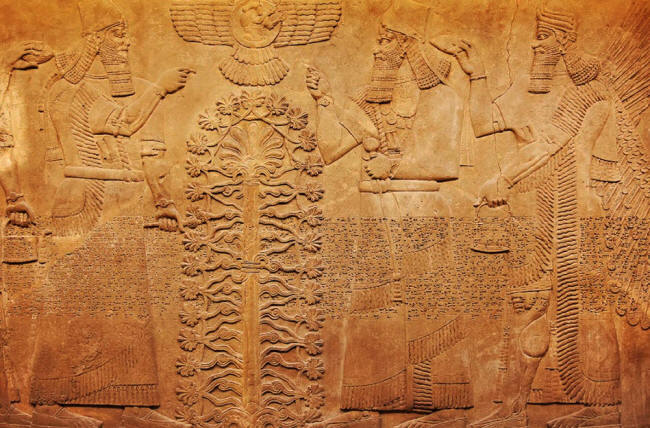
Sumerian Artifact with the Tree of Life.
(swisshippo / Adobe Stock)
Sumer, in Mesopotamia, was called
'the land of civilized kings'.
It reached its peak
around 6,500 years ago when it had the distinction of being a very
advanced civilization with a sophisticated written language,
magnificent architecture for the time, complex mathematics, and
amazing astronomy.
Hundreds of gods
comprised its religious system.
Sumerians believed that although
humans and the gods once shared the earth together, they didn't
share a co-equal existence.
Humans, they believed,
were designed for the express purpose of serving the gods.
Their chief god, Anu,
commissioned his son, Enki (Ea), and his daughter Ninki
(Enki's half-sister)
to create humans by sacrificing a
god, mixing his body and blood with clay, and forming the first
human being made in the likeness of the gods.
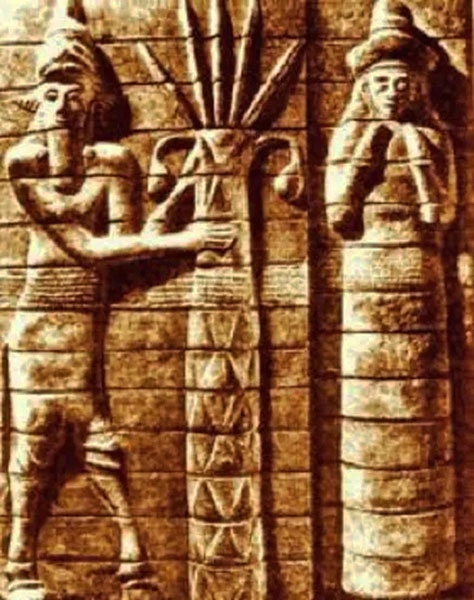
Enlil and Ninlil
(Public Domain)
The Creation
of Man: Adapa
According to Sumerian mythology, human-like gods called
Anunna had initially come
to mine resources that were needed on their home planet.
Now, with the creation of
a human labor force, their duties were changed.
They ruled over what
was, for all practical purposes, a human slave race.
Their base of
operations was Mesopotamia, the land between the Tigris and
Euphrates river.
In the
Epic of Gilgamesh, the world's
first epic poem, it was called Eden...
At first, according to the texts, humans were unable to reproduce on
their own. This proved inconvenient. So, Enki and Ninki found a way
to modify the new species.
The result was a man
called
Adapa, a fully functional and
independent human being. Enki had given Adapa great wisdom and the
ability to understand the concept of eternal life.
But Adapa's curse was
that he could never attain that which he was able to conceive.
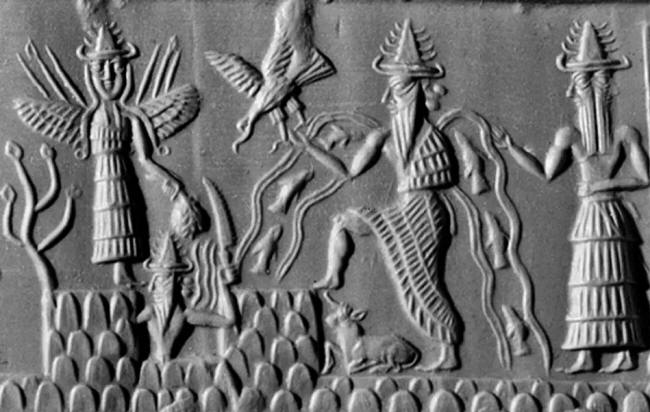
Detail of The Adda Seal.
Goddess
Inanna, god Utu, god Enki
and
chief minister Usimu.
(Public
Domain)
Were it not for the Amarna texts, discovered all the way over
in
Egypt in the archives of the Egyptian king Amenophis,
we might never know about Adapa.
But in 1912 his story was
verified and confirmed by a unique discovery in the Library of
Ashurbanipal.
Five partial fragments,
since translated, were revealed that told part of the story, called
Adapa and the South Wind.
According to the story,
Adapa had risen to
the position of priest or sage.
One day, while
fishing in the Persian Gulf, the sea became rough and his boat
capsized.
Adapa became angry
and:
"broke the wings
of the south wind."
He prevented it from
blowing for seven days and nights.
This, of course,
caught the attention of the god Anu, who wanted to punish Adapa
for the sin of hubris.
But Enki came to
Adapa's aid. He instructed him to journey to the abode of the
goddess Tammuz, who, along with Gishzida, stood guard at the
gates of heaven.
While there, he was
told not to eat or drink anything because heavenly food would
kill him.
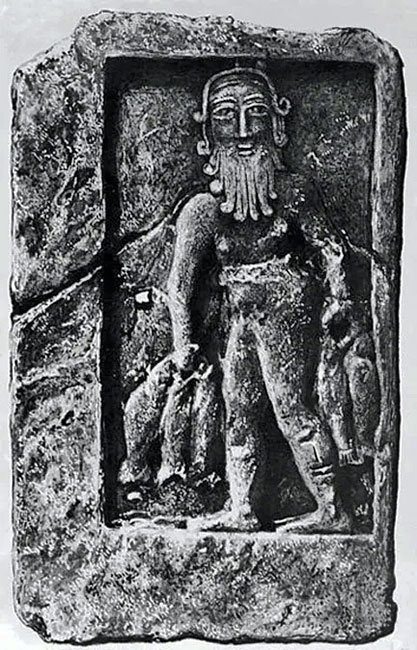
Adapa Sumerian deity of healing
(Wellcome Images / CC BY-SA 4.0)
Adapa put on traditional sackcloth and ashes, the garb of mourning,
and appeared before Tammuz and Gishzida, claiming he was in mourning
because the two gods had disappeared from his land.
Ever hospitable, they
offered Adapa food and drink. Forewarned, he refused. Only later did
he come to understand that he had made a mistake.
When he was brought
before Anu, Anu asked why he hadn't eaten the food that had been
placed before him.
He said it was because
Enki had told him not to eat:
"the bread and water
of life."
At this, Anu laughed:
"What ill has Adapa
brought on mankind...?"
If Adapa had partaken of
the food, he would have obtained immortality.
As it is,
humankind, the creation of Enki,
would henceforth suffer disease and death...
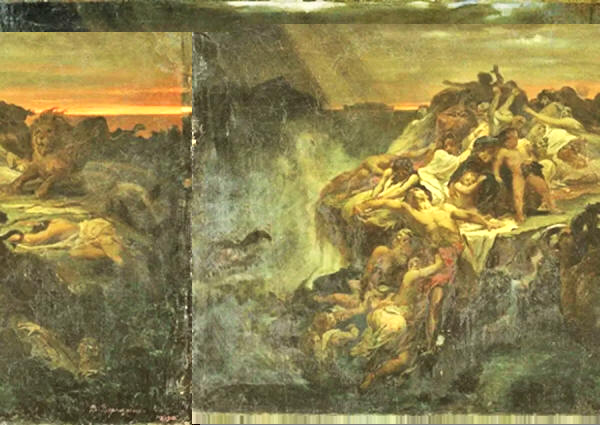
The Flood
by
Vasily Petrovich Vereshchagin (1869)
(Public
Domain)
The
Deluge
Compare this story to the biblical account.
In Genesis, God
forbid the first man from eating of the Tree of Immortality.
In the Sumerian
version, it was Enki.
This is about to become
an important distinction.
Adapa was sent back down to earth. Now the plot thickens. Enki's
brother, Enlil, hadn't been told about Enki's work. He had
wanted only an obedient slave race, and now Enki was tinkering with
things like wisdom and eternal life.
Enlil and Enki fought...
and the battle continues to this day...
Enlil advised the
gods that he was going to destroy the newly created human race
with a great flood.
Afterwards, he
reasoned, they could 'start over from scratch'... (the 'Build
Back Better' from the actual
Great Reset...)
But Enki overheard
the plans and contacted a righteous man named Utnapishtim.
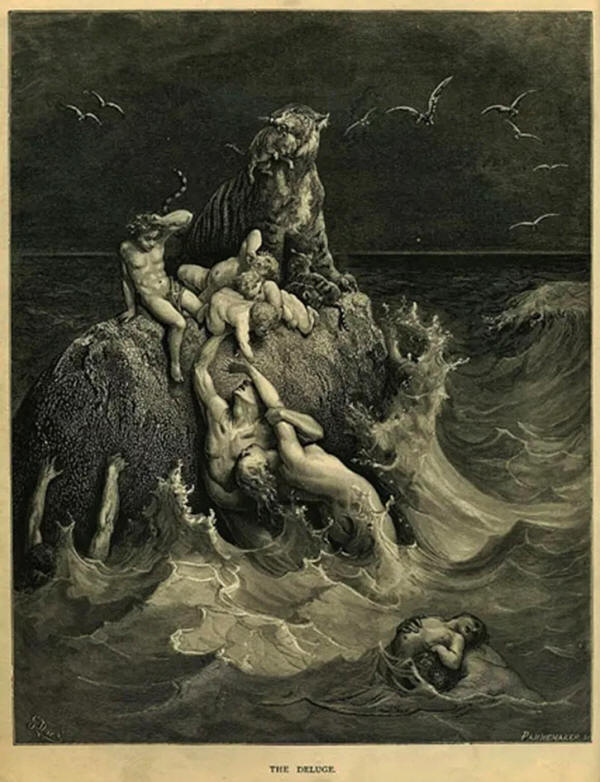
The Deluge,
frontispiece to Gustave Doré's
illustrated edition of the Bible.
Based
on the story of Noah's Ark,
this
engraving shows humans and a tiger
doomed
by the flood futilely attempting
to save
their children and cubs.(1866)
(Public
Domain)
Ancient
Sources Predating the Bible
It's important to remember that the Sumerian authors didn't
believe they were the earliest human civilization.
They claimed to have
received all this from an
earlier civilization that had, by
their time, become extinct. Who comprised this civilization, and
where they came from, is a 'mystery'...
Added to the dilemma is the fact that when we read a text such as
the Bible, we are reading the
edited work of scholars who lived centuries ago.
They made choices,
compiling one work and condensing another,
so it seems as if we
are reading a seamless book written by one author...
No one ever did that with
ancient Sumerian texts.
We read a little of this
and a little of that, from here and there, and the story doesn't
seem as uniform as the familiar Hebrew text. On top of that, some of
the old texts are written in Sumerian hieroglyphs, some in
Babylonian cuneiform, and others in ancient Egyptian.
A modern editor has a lot
to choose from, and can snip a little from one text or another,
confidant that most of us, who don't read any of the ancient
languages, will be none the wiser.
But a comparison of
Sumerian and Biblical texts, even in translation, is revealing...
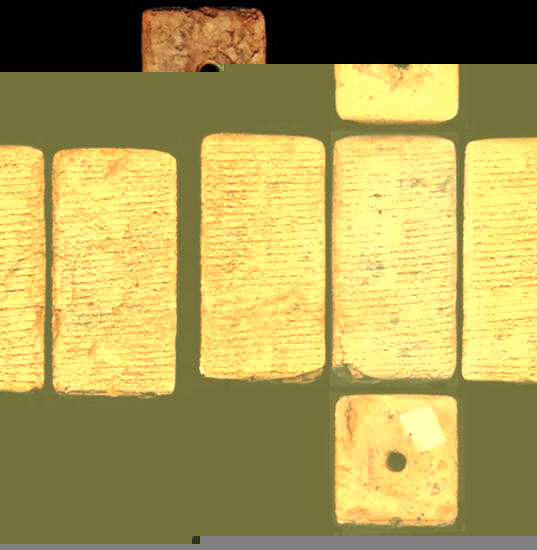
Sumerian Temple Hymn
(Walters Art Museum / Public Domain)
One of the most important Sumerian texts is called
Enki and The World Order.
In this myth, Enki
decided that the world needed to be managed by the gods
(similar thinking to
the Great Reset actors) or it would
descend into chaos.
He appointed various
overseers to supervise such activities as managing the use of
water and crops, building cities, herding domestic animals,
overseeing the heavens, and managing the activities of women.
Both the Genesis Eden
Story and the Sumerian texts address similar issues and
help us understand what was going on in the minds of the old ones at
the time of the birth of our civilization.
They can be read as
metaphors for historical precedents such as the agricultural
revolution and city building.
They are an attempt
to explain why things are the way they are in the world.
They point back to an
earlier civilization, now
lost to history.
They reveal that our
ancestors thought long and hard about philosophy and psychology.
They point to what
was even back then considered a lost golden age: paradise...
They try to plumb the
depths of human behavior and ask questions about the nature of
good and evil.
In that sense, things
haven't changed a great deal in the last 5,000 years.
But there is another way
to read these two stories.
From a religious
perspective, they are very different...
Is Eden
Paradise?
Anton Parks is a French scholar
who has devoted years to the Sumerian texts, even going so far as to
translate them himself.
He points out that the
Bible portrays our ancient ancestors being very happy in Paradise.
In the Sumerian texts, they are living in a concentration camp...
In his translation God
doesn't plant a garden for humankind in which he:
"walks in the cool of
the evening," as in Genesis.
His version says,
the
gods "came in strength
from beyond time. They were carried, one day, by the rebellion
of the universe."
His gods,
the Anunna, were very real
entities from beyond, who represented a patriarchal and a
matriarchal regime.
Enlil, the
so-called 'evil' god who wanted to enslave the human race, was quite
different from Enki, who befriended them.
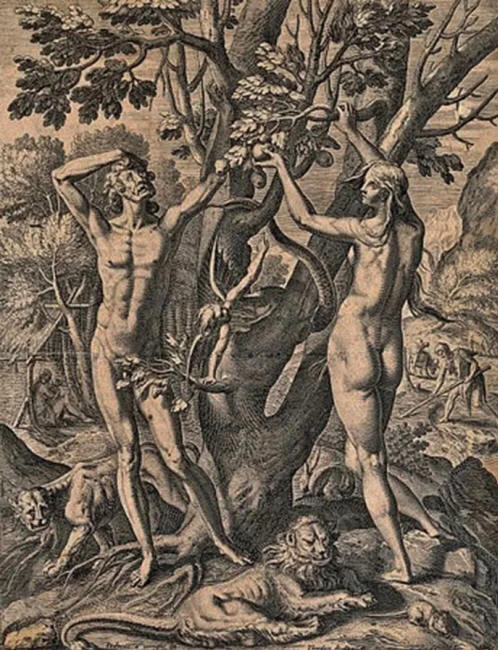
A woman-serpent
bends
around the Tree of Knowledge
as Adam
and Eve reach into the branches.
Line
engraving by T. de Bry after J. van Winghe.
(Wellcome
Images / CC BY-SA 4.0)
The feminine presence, represented by Ninki, is often
portrayed as a reptilian figure.
Could she have been
the inspiration for the serpent in the Eden of Genesis...?
If that is the case, then
the serpent wasn't evil at all.
She was trying to
free humankind by offering them the gift of the knowledge of
good and evil.
She then wanted them
to eat of the Tree of Life and,
"be like gods."
It was a good thing
she was doing, not a bad one.
But Enlil won the day.
Although he failed to
keep them from eating the fruit of the Tree of Knowledge, he cast
humans out of the garden before they ate from the Tree of Life.
And since history is both
interpreted and written by the winners, Enlil's story was later
told in Genesis... not Enki's.
That explains why the
Genesis account emphasizes the fact that sword-wielding cherubim, or
'Shining
Ones', were placed at the entrance to Eden in order to
ensure that humans never attain the godhead, or eternal life.
It has been said that
the smartest thing the devil ever did was to convince
humans that he didn't exist...
This reading of the
Sumerian myth goes one step further.
It says that the
smartest thing the devil ever did was to convince humans that he
was God.
Jehovah the
Evil God Enlil
According to Anton Parks,
YHVH of the Bible, translated
'The Lord', is not the Creator.
The creator is
Enlil, the enslaver of humankind, henceforth known as the
Demiurge.
He is head of the
Patriarchal system that wants to suppress freedom, especially
the freedom of women.
He doesn't want
equality. He wants subservient slaves.
He doesn't want
creative, right-brained, intuitive thinkers.
He wants
left-brained, obedient servants who are forced to toil every
day.
This reading of the story
says that,
humans were
upright-walking animals who were modified through DNA
manipulation to fill the role of worker bees.
The word Adam
in Sumerian, according to Parks, means 'animal'.
Eden consists
of the words E, meaning 'home' and den, which means 'life'.
Satan, in
Sumerian, means 'The Administrator'.
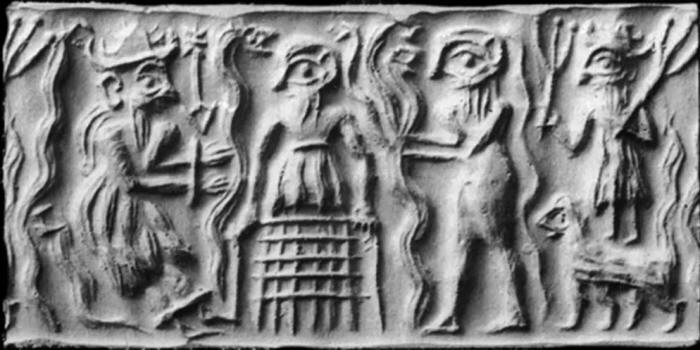
Ancient Sumerian cylinder seal impression
showing
the god Dumuzid being tortured
in the
Underworld by galla demons
(Public
Domain)
Enki managed to grant wisdom to humans when he, through Ninki,
the 'serpent' of Eden, gave them the ability to discern between good
and evil.
That caught Enlil by
surprise. The best he could do was to drive them out of Eden and
forbid their return.
To put it bluntly,
according to this
reading of the story, the God whom monotheists have been
worshipping for the last 5,000 years is not Jehovah, the
creator God.
He is Enlil, the
patriarchal Demiurge - Satan himself.
This explains the
God of the Old Testament who sent the flood to destroy
humankind, who commanded the Israelites to kill innocent
Canaanite women and children, who was the justification for
the Crusades and
the Inquisition, who seems so
incredibly bloodthirsty.
It explains why the
author of John in the New Testament could declare that:
"we know we are
of God and the whole world is in the hands of the
evil one" (1 John 5:19).
He recognized that
humans have been fighting the good fight, trying to get back to
Eden.
According to this
interpretation, we are caught in a divine battle of competing
spiritual forces.
We still need to,
"earn our daily bread
by the sweat of our brow."
It's just that we have
turned our curse into a search for meaning.
We want to get back to
Paradise...
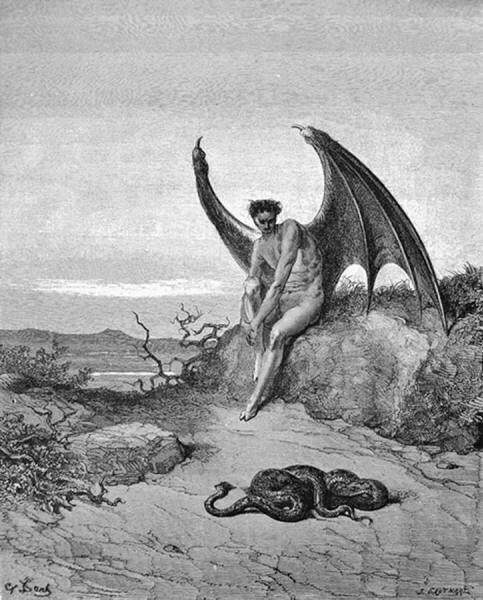
Gustave Doré, illustration to Paradise Lost
"... he
[Satan] held on His midnight search,
where
soonest he might find /
The
Serpent: him fast sleeping soon he found ..."
(Public
Domain)
Sophia, Wisdom
the Word of God is Feminine
There are indications that the
Gnostic texts, discovered in Nag Hammadi,
Egypt, in 1945, sympathized with this version of the story.
The Gnostics were an
early Christian sect that was declared heretical by the Roman
establishment.
The church burned their scriptures and made sure none
of them, except for perhaps, the Gospel of John, made it into
the New Testament.
But with the discovery of
books that had been hidden away and kept from destruction, we now
know that to the Gnostics, wisdom, or Sophia, represented a feminine
energy that refused to be kept buried.
She was the Logos, or
Word of God...
The Gnostics believed there was a bigger game being played out,
by forces outside of planet Earth.
The Universe is
bigger than we realize, they declared.
As a matter of fact,
the universe is simply one cell in the immense body (Multiverse)
that is God.
Here on earth the battle
between good and evil, between the feminine and the masculine,
between Enki and Enlil, is raging.
But good will eventually
triumph...
This religious system of belief says,
we have an 'angel' on
one shoulder and a 'devil' on the other.
Their names are Enki
and Enlil.
The earth may be the
domain of the Demiurge, but that domain itself is called 'Mother
Earth', the world of Sophia, the goddess of wisdom, the divine
spark that Enlil, the devil, strives to put out.
The Demiurge may
dominate our day to day reality, but Eden still awaits if we can
only persevere.
And we are not
alone in the battle...
This is a completely
different reading than the biblical account many of us
grew up with, and whether we read it allegorically or historically,
it causes us to pause and think about what we have been taught in
our impressionistic youth:
to contemplate the idea that we are
involved in something a lot bigger than we thought...
This article is an edited excerpt from the
Jim Willis' new
book, 'Lost
Civilizations - The Secret Histories and Suppressed Technologies of
the Ancients,' published in October 2019.
|











